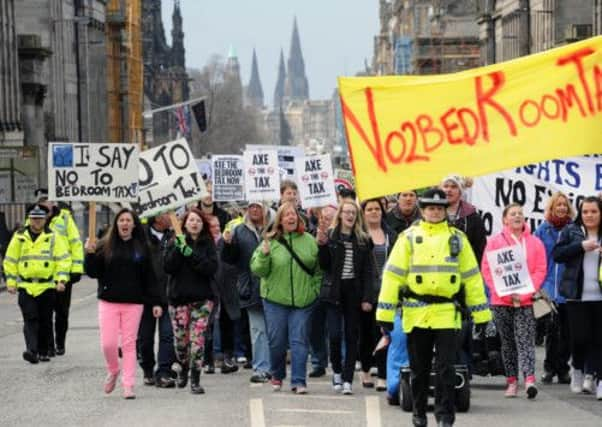Unison: Building for future must start today


Our homes are not just buildings in which we sleep and eat – they are much more than that. Our homes are the bases from which we create our lives, our families and our communities, our culture and our society. Improving housing is essential if we are to make Scotland a fairer more socially just place to live.
Scotland is facing a housing crisis. There are more than 180,000 people on local authority waiting lists alone. While attention is rightly focused on the so called “bedroom tax” and its arbitrary under-occupancy measure, almost 60,000 homes are overcrowded.
Advertisement
Hide AdAdvertisement
Hide AdHouse-building levels are at their lowest since 1945. People can’t afford to buy homes and the costs of private sector rents are skyrocketing. It is clear that there aren’t enough homes. There are papers full of statistics and plenty of university housing courses but in the end it’s quite simple, we need more homes, we need the right homes and they need to be affordable to ordinary people.
In the not too distant past, all political parties competed on their promises of extra and improved social housing. Sadly this is no longer the case. Housing is left to the market – with social housing seen by many as the tenure of last resort, merely a safety net for those who need it.
Improving the availability and the quality of social housing will restore it to being the tenure of choice and bring vast improvements to the lives of our people.
Scotland has a growing population. We are living longer and having more children. Household numbers in Scotland have grown by 8 per cent (180,530) since 2001, much more rapidly than the population as a whole.
The latest census found that single person households are now the largest group of householders at 35 per cent. In 1961, this was the least common household.
There are simply not enough smaller homes to meet existing demand. The depressed state of the housing market also means that many people who would like to downsize are having difficulty selling their current homes.
The new “bedroom tax” – as well as being grossly unjust in itself – will add to this increasing competition for the already scarce, smaller homes in both the private and social rented sector.
Size is not the only issue with current housing stock. There is a range of differing housing needs for people living with disabilities, or who have other requirements for support
Advertisement
Hide AdAdvertisement
Hide AdThe market has failed. The private sector cannot deliver. There is a clear need for government action – but if the public sector is to fund housing expansion, it is crucial that money is not lost to private profit.
Building social housing will provide secure affordable homes and ensure the best use of public money. It will also create and secure well-paid skilled jobs. Building social housing means that people benefit through improved housing choice. Meanwhile, the reduction in housing benefit bills and the income from rents to local authorities can be reinvested.
Cuts to the Scottish block grant and budget choices made by the Scottish government – together with the banking sector’s reluctance to lend – have had an impact on housing funding.
The Scottish Federation of Housing Associations states that, “it is hard now to see where the next house-building projects are coming from in future years, as subsidy options, bank lending terms and regulation issues make housing delivery very difficult”.
Local authorities need to use their borrowing powers to fund an expansion of social housing. They are in need of secure long-term investments. Unison has drawn up a proposal to encourage pension funds to invest with registered social landlords (RSLs).
Fuel poverty clearly has damaging implications to health and educational achievement for those who experience it. There are also implications for the maintenance of the public sector housing asset. The solution requires both improved property standards and insulation and access to cheaper heating.
Private sector tenants need secure affordable homes too. They require a proper system of rent control, improved regulation of landlords and decent housing standards.
As well as improving tenants’ lives, they would bring enormous economic benefits for society. Rent control would lead to substantial savings in housing benefit and the disposable income of tenants. Of course, rent controls, regulations and standards are only effective as long as they are enforced whenever necessary.
Advertisement
Hide AdAdvertisement
Hide AdHousing is a key policy area for any country that aims to reduce poverty and inequality, and their long-term effects on health and wellbeing. The market has failed, only an expansion of public sector housing can fulfil these aims.
• Dave Watson is the Head of Bargaining and Campaigns at Unison Scotland